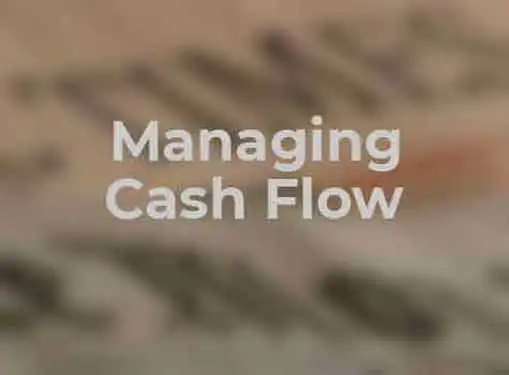Entrepreneurial Finance
The Golden Guide to Managing Cash Flow
Written by Scott Scheper for Gaebler Ventures
Managing cash flow is the antidote to business failure. We discuss some surefire ways to make sure your business checking account balance stays in the black.
"Turnover is vanity, profit is sanity, but cash is king" --Alan Morris, Director, Cash Management, KPMG

The cash-flow statement shows the effects of a company's operating, investing and financing activities on its cash balance.
It answers the following questions: How much cash did the firm generate from operations? How did the firm finance fixed capital expenditures? How much new debt did the firm add? Was the cash from operations sufficient to finance fixed asset purchases?
In essence, it's the schedule of cash receipts and disbursements. But why is it important? Why should you care about it?
Simply put, it's the number one killer of small businesses. This is perhaps why women, who in most households manage the family finances, generally outlast men as entrepreneurs. According to a real life entrepreneur named Josh (pseudo-name), "Lack of cash flow eventually killed off my freelancing business and had me working more hours for less money than any of my previous employment arrangements. My younger sister was making more per hour than me serving coffee at a local café."
By now, it's crystal clear: one must learn to realistically manage their cash flow. The following tips as a checklist for managing cash -- a pragmatic tour guide into the world of cash management:
Kill temptation before it kills you.
If you get a business checking account, avoid getting a debit card. If you absolutely have to, then for your own sake, don't carry it with you at all times. Woody Allen once said, "I can resist anything in this world...except temptation." Why not kill temptation before it bites by not carrying a piece of purchasing power?
Buy what you need, not what you want.
There's only two desires in the lives of entrepreneurs. There's no oughts, musts, shoulds, woulds or coulds. There's only two: want and need. Buy what you need, not what you want. If you follow that principle, you'll be safe in managing cash.
Get real.
Make it a rule to be pessimistic regarding your cash flow statement. Always over-guesstimate your expenses and under-guesstimate your income. Your cash flow should never be your optimistic forecast; it shouldn't even be your expected forecast. It should always be the 'worst-case scenario.' If you can survive in the worst-cast scenario, you can expect an inflow of happiness in better scenarios.
Constantly reengineer your cash flows.
You may have noticed in the precedent step that the term 'guesstimate' was used. Really, forecasts are nothing more than guesses and estimates combined. As time unfolds, one must inevitably correct, update and re-guesstimate their cash flow statement. Make a habit of this. Once every week is standard for brand new ventures. Once you get a couple years under your belt, once a month updates will be enough.
Scott Scheper is a venture finance enthusiast and serial entrepreneur hailing from Orange County, CA. Scott recently graduated from Chapman University where he was a Cheverton Fellow and graduated with honors in Finance, Management and Marketing.
Share this article
Additional Resources for Entrepreneurs

Conversation Board
Every entrepreneur needs to know how to manage cash flow. If you've got a useful tip to share, please post it below.